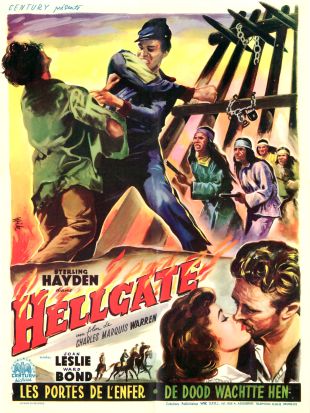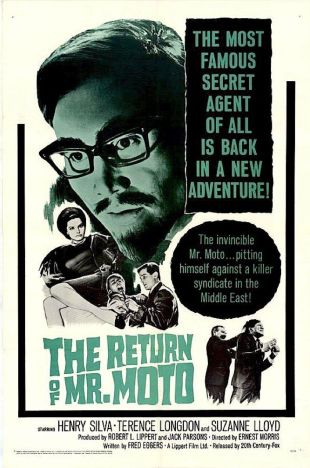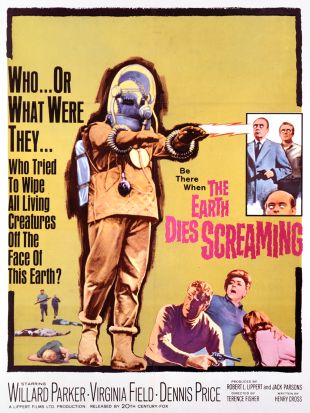Producer Robert L. Lippert may not be a familiar name to many filmgoers in the 21st century, but as the head of Lippert Pictures in the 1940s and early '50s and founder and president of Regal Pictures in the late '50s, he produced or distributed many a cult favorite. Among the 300 or so movies he produced were notable works by Samuel Fuller, as well as several science fiction efforts, most notably Rocketship X-M and Kronos, that have come to be regarded as minor classics of the genre. Lippert got his entrée into the movie industry from the ground up. He was born on the eve of American cinema's first great blooming as a storytelling medium in the hands of filmmakers such as D.W. Griffith and Charles Chaplin, and found himself spellbound by the new medium as he grew into boyhood. He had little interest in his father's hardware business, instead choosing to run errands and do minor chores at the local movie house so that he could see as many films as possible. He was a fast learner and developed considerable skill as a projectionist -- a job that one could aspire to in those days without a lot of union clearances -- and eventually began improving the projectors with which he worked. Lippert mixed this nuts-and-bolts knowledge of film exhibition with the ambition to succeed, and by his thirties he owned a chain of 60 movie theaters that ran from California to Oregon. In the early '40s, having succeeded at every relevant aspect of showing movies, Lippert decided to try his hand at movie production with a B-Western called Wildfire, starring Bob Steele. Produced through Lippert's fledgling company, Action Pictures, Inc., it was subsequently released in 1945 by Screen Guild, a new company headed by John J. Jones, of which Lippert was vice president. Little of Screen Guild's output was significant, even in B-movie circles, though one release, the horror/suspense vehicle Scared to Death, is notable for its bizarre structure and, as a Cinecolor release, for being Bela Lugosi's only color film. By 1948, Lippert had taken over the company completely and re-organized it as Lippert Pictures the following year. Lippert tried his hand at directing for the first and only time in 1948 with Last of the Wild Horses, but then turned his attention almost exclusively to producing with occasional efforts at writing. Although a lot of Lippert's releases were of the routine, programmer variety, such as Fast on the Draw and G.I. Jane(Reginald Le Borg's 1951 B-movie, not Ridley Scott's higher-profile work from the late '90s), the studio occasionally generated movies that critics and the public embraced as serious art and entertainment.
On the directorial front, Lippert Pictures had an edge over all of the other B-studios of its era due to the presence of up-and-coming talent Samuel Fuller, whose early films -- The Baron of Arizona, I Shot Jesse James, and The Steel Helmet (arguably the best movie ever issued by Lippert Pictures) -- were all produced there. Additionally, Lippert produced Little Big Horn and Hell Gate, two very fine cavalry and Western adventures, respectively, directed by Charles Marquis Warren. The company was also responsible for producing Rocketship X-M, a film that, along with George Pal's Destination Moon, opened the postwar science fiction boom. It was releases like those that made up for such ill-starred genre efforts as Sam Newfield's The Lost Continent (1951), a sci-fi/jungle adventure disaster that was kidded unmercifully (and justifiably so) on Mystery Science Theater 3000 in the 1990s. [Note: Several other of Lippert 's sci-fi releases were "MST-fied," but on a more good-natured basis.] In 1953, the company also joined England's Hammer Films in a co-production deal for the intriguing sci-fi/espionage hybrid Spaceways. Toward the end of the company's existence, Lippert Pictures also provided an outlet for sci-fi film specialist Bert I. Gordon and his ultra-low-budget interplanetary effort King Dinosaur. Audiences usually knew what to expect from a Lippert Pictures release -- action, adventure, some drama, and a few laughs (most of them intentional) all woven together in an entertaining whole that was always worth (and sometimes worth a good deal more) than the cost of admission; younger viewers, especially, came to appreciate the Lippert titles aimed at them. In 1955, Robert L. Lippert sold out his original company and the following year formed Regal Pictures, an independent production company that distributed its movies through 20th Century Fox. The Fox connection proved important not just as a reliable distributor, but also as a source of films -- when 20th Century Fox made Kurt Neumann's sci-fi thriller Kronos, the project was given to Regal, which benefited from having a film go out under its banner that was shot in Cinemascope. By the early '60s, Robert L. Lippert was regularly crossing over to the Fox lot proper and serving as executive producer on such movies as The Yellow Canary (1963), a crime film starring Pat Boone, that played a quiet but key role in breaking the blacklist by employing Jeff Corey in his first acting role in a dozen years. He was also the producer of Curse of the Fly, the studio's 1965 attempt to extend the "franchise" of The Fly and Return of the Fly to the 1960s. Lippert retired from film production in the mid-'60s and went back to running his original theater chain, having proved himself a success on both ends of the business. Of the 310 movies that he produced, a large handful -- mostly those by Fuller and Warren, plus a few dramas and the science fiction efforts -- are still studied closely as well as shown in repertory theaters and have developed followings on home video. His son, Robert L. Lippert Jr., became a successful editor and later a director of action films.


